If you’re looking to boost your startup in 2025, I recommend exploring top growth hacking books that combine proven tactics, real-world case studies, and practical frameworks. Titles like *Hacking Growth*, *Growth Hacking: Silicon Valley’s Secret*, and *Mind Hacking* offer actionable strategies for rapid scaling, customer engagement, and mindset shifts. These books help you understand how innovative companies grow fast. Keep exploring to uncover the insights that could make your startup thrive.
Key Takeaways
- The list should include books that emphasize data-driven experimentation, customer insights, and scalable growth strategies suitable for startups.
- Look for titles offering step-by-step frameworks, practical tactics, and real-world case studies from Silicon Valley success stories.
- Prioritize books that combine growth hacking fundamentals with personal mindset and psychological strategies for sustained success.
- Ensure the books cover modern digital marketing tactics, AI integration, and tools for rapid, sustainable startup growth.
- Select titles that are immediately applicable, with templates, screenshots, and actionable advice tailored for startup founders.
Hacking Growth: How Todays Fastest-Growing Companies Drive Breakout Success
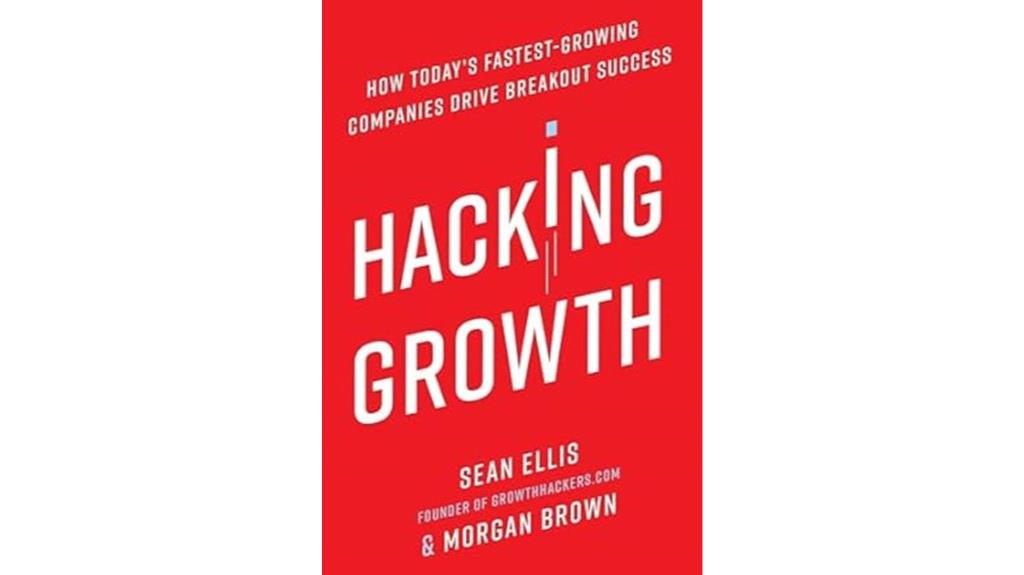
If you’re a marketer, entrepreneur, or product manager looking to open rapid growth, “Hacking Growth” is an essential read. It redefines growth hacking as a mindset, not just a tactic, emphasizing continuous experimentation, small tests, and iterative improvements. The authors show that sustainable growth results from understanding customer “aha” moments, achieving product-market fit, and identifying key growth levers. Through real-world examples like Dropbox, Airbnb, and Twitter, the book illustrates how top companies build scalable growth engines. It provides a step-by-step process to assemble growth teams, run high-tempo experiments, and develop a culture of data-driven decision-making.
Best For: entrepreneurs, marketers, and product managers seeking scalable, sustainable growth through data-driven experimentation and iterative testing.
Pros:
- Offers a clear, methodical process for building growth engines applicable across industries.
- Provides numerous real-world examples from successful companies like Dropbox, Airbnb, and Twitter.
- Emphasizes a growth mindset focused on continuous experimentation and long-term scalability.
Cons:
- Writing style can be dry and repetitive, potentially hindering readability.
- Content may be situational, more relevant to certain industries or company sizes than others.
- Lacks groundbreaking insights, serving more as a practical guide than an innovative breakthrough.
The Growth Hacking Book
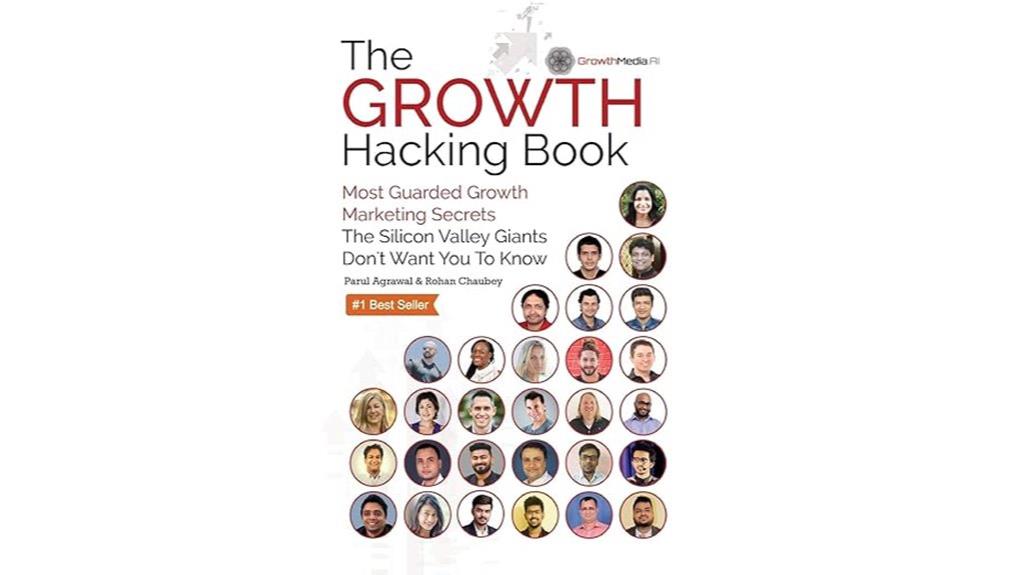
The Growth Hacking Book stands out as an essential resource for entrepreneurs and marketers keen to gain access to proven growth strategies. It reveals guarded secrets from Silicon Valley, covering tactics like SEO, content marketing, and social media growth across platforms like Instagram, LinkedIn, and Twitter. The book offers step-by-step guidance with screenshots, making complex strategies easy to implement. It emphasizes developing the right skillset, toolset, and mindset to unearth organic growth. Designed for beginners and startups, it combines expert insights, practical tips, and resources to help you build a sustainable digital presence. This book is a must-have for accelerating your growth in today’s competitive online landscape.
Best For: entrepreneurs, marketers, and startups seeking practical, proven digital growth strategies to enhance their online presence and scale their business effectively.
Pros:
- Provides step-by-step guidance with screenshots for easy implementation of complex strategies
- Covers a wide range of essential topics including SEO, content marketing, and social media growth across multiple platforms
- Features insights from industry experts, offering valuable tips and resources for continuous learning
Cons:
- May require some prior familiarity with digital marketing concepts for optimal understanding
- Focuses primarily on organic growth tactics, less emphasis on paid advertising strategies
- As a comprehensive guide, it can be dense for complete beginners without supplementary resources
Growth Hacking: Silicon Valleys Best Kept Secret

Curious how Silicon Valley’s rapid growth secrets can be applied to your business? “Growth Hacking: Silicon Valley’s Best Kept Secret” reveals proven strategies from industry veterans that make high-speed scaling achievable for entrepreneurs and startups. Authors Raymond Fong and Chad Riddersen break down Silicon Valley’s success stories, like Oculus selling to Facebook in under 24 months, and introduce the Automated Sales Process™ (ASP™). This framework helps businesses attract leads, create strong first impressions, engage prospects, leverage sales tech, and foster referrals. It’s a practical, accessible guide that demystifies high-growth tactics, allowing you to implement proven methods without unnecessary risk or fluff.
Best For: entrepreneurs, startup founders, and small business owners seeking practical, proven growth strategies to scale rapidly without extensive resources.
Pros:
- Provides clear, actionable frameworks like the Automated Sales Process™ (ASP™) that are easy to implement.
- Demystifies Silicon Valley growth secrets with real-world examples and practical tips.
- Suitable for both beginners and experienced entrepreneurs due to its straightforward, concise style.
Cons:
- May oversimplify complex growth strategies for more advanced or larger-scale businesses.
- Focuses primarily on online and digital marketing tactics, limiting applicability to certain industries.
- Lacks in-depth technical details for those looking for highly specialized or technical growth hacking methods.
Mind Hacking: How to Change Your Mind for Good in 21 Days

Mind Hacking: How to Change Your Mind for Good in 21 Days stands out as a must-read for anyone enthusiastic to reprogram their thoughts and habits quickly. I found its practical advice, backed by studies and real-life stories, incredibly accessible. The book simplifies complex psychological ideas like CBT and emotional detachment, making them easy to apply daily. Its humor, straightforward exercises, and relatable tone help break mental barriers like anxiety, addiction, or depression. I’ve used its techniques to replace negative patterns with positive habits, seeing real progress in just three weeks. If you’re serious about transforming your mindset fast, this book offers a clear, actionable roadmap.
Best For: individuals eager to quickly reprogram their thoughts and habits for personal growth and mental well-being using practical, easy-to-apply strategies.
Pros:
- Practical, actionable advice supported by studies and real-life stories
- Simplifies complex psychological concepts like CBT and emotional detachment for everyday use
- Engaging tone with humor and relatable anecdotes that motivate ongoing self-improvement
Cons:
- Some readers find the trendy jargon overused or distracting
- Occasional repetition and less engaging ending may reduce overall impact
- Audiobook narration quality is poor, which can hinder the listening experience
Growth Hacking for Small Businesses: A.I. Powered Approach
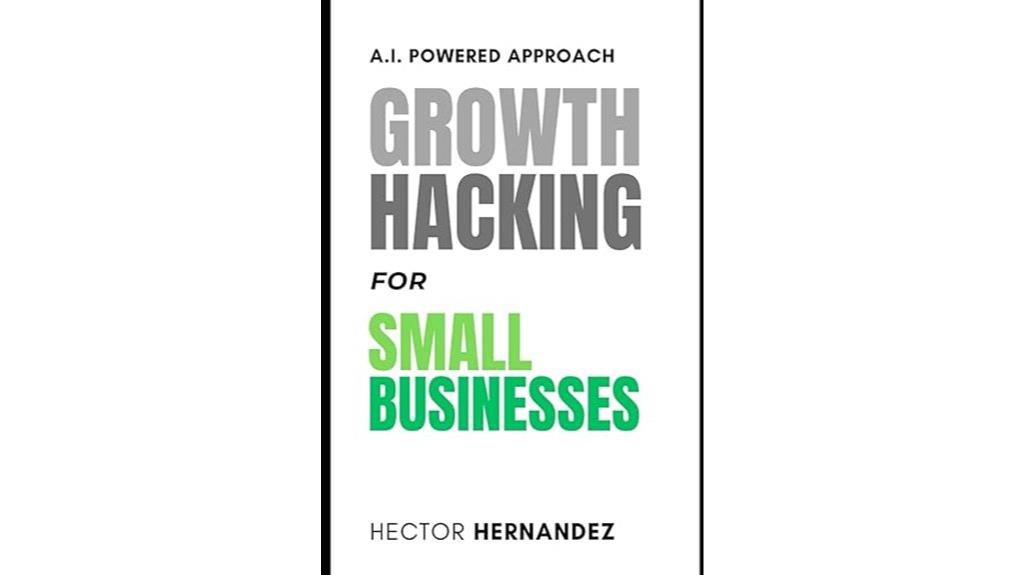
If you’re a small business owner looking to harness AI for growth, “Growth Hacking for Small Businesses: A.I. Powered Approach” is a practical guide I highly recommend. Hector Hernandez simplifies complex strategies into easy steps, focusing on real-world applications like chatbots, lead automation, and content creation. The book provides actionable techniques with ChatGPT prompts to analyze reviews, define target audiences, and map customer journeys. Designed for beginners, it offers clear guidance, visual aids, and quick test ideas to boost engagement and efficiency. Despite some Kindle formatting issues, it’s a valuable resource for entrepreneurs enthusiastic to leverage AI for sustainable growth.
Best For: small business owners and entrepreneurs seeking practical, AI-driven growth strategies without requiring advanced technical skills.
Pros:
- Simplifies complex AI concepts into actionable steps suitable for beginners
- Includes specific ChatGPT prompts for real-world applications like customer review analysis and customer journey mapping
- Visual aids and clear guidance help reduce overwhelm and facilitate quick testing of ideas
Cons:
- Kindle version contains only four pages, which may be misleading for some readers
- Some readers find the book lacks in-depth technical detail for advanced AI applications
- May require supplementary resources for those seeking more comprehensive AI implementation strategies
Ready, Set, Growth Hack: A Beginner’s Guide to Growth Hacking Success

“Ready, Set, Growth Hack” stands out as an ideal beginner’s guide for entrepreneurs and small business owners enthusiastic to access rapid and sustainable growth. I found Sabry’s approach invigoratingly practical, offering clear, actionable strategies that demystify growth hacking. The book emphasizes innovation, a growth mindset, and data-driven tactics, making complex concepts easy to grasp. Whether you’re developing your product or ramping up marketing efforts, Sabry’s real-world insights help visualize and implement effective growth plans. It’s a straightforward, engaging resource that provides a complete roadmap, making it perfect for those just starting out but aiming for big results.
Best For: entrepreneurs, small business owners, and marketing professionals seeking practical, beginner-friendly strategies for rapid and sustainable growth.
Pros:
- Clear, actionable strategies that simplify complex growth hacking concepts
- Emphasizes innovation, a growth mindset, and data-driven tactics for effective results
- Engaging storytelling and organized structure make learning accessible and enjoyable
Cons:
- May lack advanced techniques needed for experienced growth hackers
- Focused primarily on beginner-level insights, possibly limiting depth for seasoned professionals
- Some readers might find the general approach less tailored to specific industry nuances
The Hacking Growth Method (Spanish Edition)

The Hacking Growth Method (Spanish Edition) stands out as an essential resource for digital marketers, UX professionals, and entrepreneurs enthusiastic to scale fast. It offers a systematic approach focused on rapid testing, innovation, and understanding customer behavior. The book emphasizes continuous experimentation—”probar, probar, y probar”—to boost performance and develop new ideas quickly. It aligns well with frameworks like SCRUM, SPRINT, and Lean Startup, providing practical examples that inspire immediate action. Despite some translation issues, readers find it a valuable guide for applying proven growth hacks and accelerating their business expansion in a competitive landscape.
Best For: digital marketers, UX professionals, entrepreneurs, and growth teams seeking a systematic, practical approach to rapid business expansion through continuous experimentation and proven growth hacks.
Pros:
- Provides a clear, organized methodology for growth based on tested strategies and practical examples.
- Aligns well with frameworks like SCRUM, SPRINT, and Lean Startup, facilitating integration into existing processes.
- Inspires immediate action with verifiable case studies and straightforward guidance for scaling businesses rapidly.
Cons:
- Some readers find the content rehashes Lean Startup concepts without offering significant innovation.
- Translation issues in the Spanish edition may hinder comprehension, requiring cross-referencing with the original English version.
- Physical quality concerns, such as packaging and durability, have been noted, affecting the overall experience.
Hacking College: Why the Major Doesnt Matter―and What Really Does
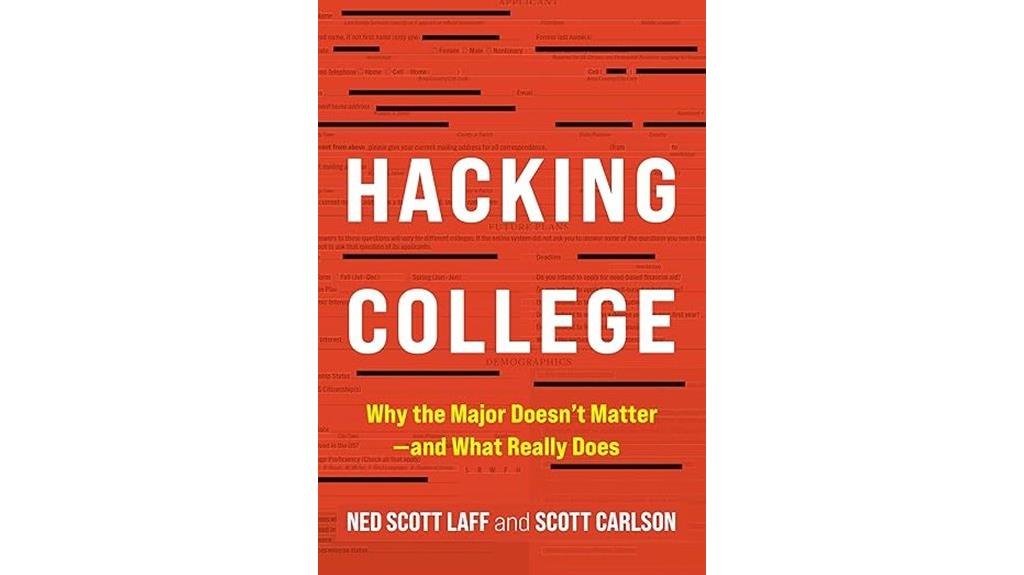
Hacking College: Why the Major Doesn’t Matter—and What Really Does is an essential read for students, educators, and counselors who want to rethink traditional approaches to higher education. It challenges the idea that choosing a major guarantees success, emphasizing personal purpose and lifelong learning instead. The book highlights that post-graduation outcomes depend more on skills and individual exploration than on the specific degree or college attended. I appreciate its practical strategies, like the Field of Study course, which help students find alignment and build adaptability. This perspective encourages us to view education as a flexible, purpose-driven journey rather than a fixed ticket to success.
Best For: students, educators, and counselors seeking innovative, practical approaches to improve college outcomes, career readiness, and personal development beyond traditional major-focused paths.
Pros:
- Emphasizes personal purpose and lifelong learning over rigid major choices.
- Offers practical strategies like the Field of Study course to enhance student adaptability.
- Accessible, action-oriented content with relatable examples and templates.
Cons:
- Relies heavily on the authors’ experiences at specific institutions, which may limit broader applicability.
- Repetition of the Field of Study approach throughout the book can become tiresome.
- May underemphasize the importance of specific majors for certain career fields or industries.
Ethical Hacking: A Hands-on Introduction to Breaking In

If you’re new to cybersecurity or have some IT experience like help desk or network engineering, “Ethical Hacking: A Hands-on Introduction to Breaking In” is an ideal starting point. It’s designed for beginners and intermediates, making complex concepts accessible through clear, step-by-step instructions. The book covers essential topics like penetration techniques, networking fundamentals, and practical hacking labs, including setting up Kali Linux environments. With hands-on tasks, real-world examples, and active community support, it encourages active practice and understanding. Many users praise its clarity and thoroughness, making it a valuable resource for anyone enthusiastic to learn ethical hacking from scratch.
Best For: beginners and intermediates with some IT background seeking a comprehensive, hands-on introduction to ethical hacking and cybersecurity.
Pros:
- Clear, step-by-step instructions making complex concepts accessible
- Practical labs and real-world examples enhance active learning
- Strong community support through Discord channels and author interaction
Cons:
- May be too easy for advanced cybersecurity professionals seeking in-depth technical details
- Steep learning curve without prior computer or network experience
- Limited coverage of advanced hacking techniques or specialized topics
Master Growth Hacking Book by Apurva Chamaria & Gaurav Kakkar
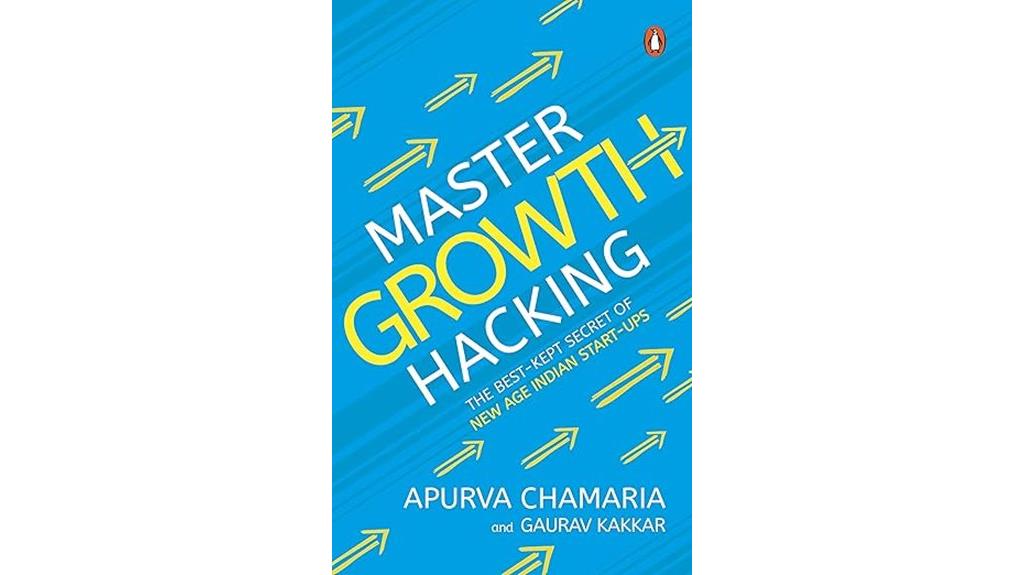
For beginners or those seeking practical, easy-to-understand insights into growth strategies, Master Growth Hacking by Apurva Chamaria and Gaurav Kakkar stands out as an excellent choice. The book uses simple language, avoiding technical jargon, which makes complex concepts accessible to everyone. It features real-world examples, screenshots, and interviews with successful entrepreneurs, making the strategies actionable and relatable. While some might find it basic or superficial, its focus on practical, immediately applicable hacks makes it a valuable resource for startups, students, and professionals alike. Overall, it inspires curiosity, action, and continuous learning in the world of growth hacking.
Best For: beginners, entrepreneurs, students, and management professionals seeking practical, easy-to-understand growth hacking insights without technical jargon.
Pros:
- Simple language and accessible explanations make complex concepts easy to grasp.
- Includes real-world examples, screenshots, and interviews that enhance practical understanding.
- Focuses on actionable hacks and strategies suitable for immediate implementation.
Cons:
- May be considered superficial or basic for experienced digital marketers or growth hackers.
- Lacks in-depth or advanced growth hacking techniques and master-level insights.
- Some readers find the interviews and content to be somewhat superficial or lacking depth.
Factors to Consider When Choosing Growth Hacking Books

When selecting a growth hacking book, I focus on how practical and actionable the content is for real-world application. I also consider if the book’s industry relevance matches my needs and if the author’s expertise is credible. Additionally, I look at my learning style and whether the book offers the right level of depth to deepen my understanding.
Practical Application Focus
Choosing the right growth hacking book means looking for resources that deliver actionable insights backed by real-world examples. I focus on books that include detailed case studies showing how strategies are practically implemented, giving me clear models to follow. Step-by-step guides, templates, and hacks are essential for immediate application, helping me test ideas quickly within my own projects. I also prioritize books that promote a scientific, experimentation-driven mindset, encouraging continuous testing and iteration for tangible results. Additionally, I seek titles covering a broad range of growth areas—customer acquisition, retention, monetization, and product optimization—to guarantee thorough application. Lastly, I look for tools, frameworks, or methodologies I can adapt and integrate into my existing processes, making learning both practical and immediately useful.
Industry Relevance
Selecting a growth hacking book that aligns with your industry guarantees the strategies you learn are relevant and effective. I look for books tailored to my specific sector, whether it’s SaaS, e-commerce, or B2B services, because industry-specific tactics matter. I check if the content includes case studies and examples that mirror my business context, ensuring practical applicability. It’s also important that the terminology and tactics reflect current trends and technological innovations, so I stay ahead of the curve. I prefer books that address unique challenges like customer acquisition channels, retention metrics, or monetization models relevant to my industry. Additionally, understanding industry regulations, compliance issues, and market dynamics helps me adapt strategies that are both compliant and effective in my field.
Author Expertise
The expertise of an author plays a crucial role in determining the value of a growth hacking book. When I choose a book, I look for authors with real-world experience in marketing, entrepreneurship, or technology, as these backgrounds ensure the strategies are relevant and practical. Authors with hands-on industry success or proven track records in scaling businesses tend to provide actionable advice I can trust. While academic or research-based writers may offer valuable frameworks, I prioritize those who have implemented tactics successfully. Verified credentials, such as leadership roles or notable ventures, further boost an author’s authority. Ultimately, an author’s practical experience guarantees that the insights shared are not just theoretical but grounded in real results, helping me apply them effectively to my startup.
Learning Style Compatibility
Since everyone processes information differently, evaluating your preferred learning style is essential when picking a growth hacking book. If you’re a visual learner, look for books with diagrams, screenshots, and visual aids that clarify complex concepts. For hands-on learners, choose books offering practical exercises, step-by-step guides, or real-world case studies that allow you to apply what you learn immediately. If you prefer theory, find books that focus on foundational concepts before diving into strategies. Consider the complexity level of the language—ensure it matches your current understanding so you’re not overwhelmed or bored. Ultimately, reflect on your engagement style; if interactive learning excites you, seek books with quizzes or labs. Matching the book to your style will make your learning more effective and enjoyable.
Depth and Detail
When choosing a growth hacking book, it’s vital to examine how deep and detailed the content truly is. I look for books that go beyond superficial tips, offering extensive coverage of topics like acquisition, retention, and scaling. Practical case studies, step-by-step processes, and real-world examples are critical, as they provide actionable insights rather than just theory. I also assess the level of technical detail, such as data analysis, A/B testing, and automation techniques, which reflect a deeper understanding of growth strategies. Additionally, I prefer books that thoroughly discuss various growth levers and frameworks, ensuring I can adapt techniques to different industries. Beware of overly brief or generalized books—they often lack the depth needed for meaningful implementation and are less valuable for sustained growth.
Up-to-Date Content
To select a growth hacking book that stays relevant, I focus on whether it includes recent case studies and examples that mirror current digital marketing trends and technologies. I look for books that cover the latest tools, platforms, and algorithms shaping growth strategies today. Updated publications or those that specify recent developments are particularly valuable, as they reflect the evolving digital landscape. I also check if the content addresses recent shifts in consumer behavior, privacy policies, and data regulations, which heavily influence growth tactics now. Ideally, the book incorporates current industry best practices aligned with the latest digital marketing ecosystem. Staying up-to-date ensures I’m learning strategies that are effective and applicable in today’s fast-changing environment, helping me stay ahead of the competition.
Case Study Availability
Have you ever wondered how growth hacking books demonstrate their strategies in action? The key is through detailed case studies that showcase real-world applications. A great book should include multiple examples across different industries, highlighting how concepts are practically implemented. Well-documented cases lend credibility and help you see what works, increasing the book’s practical value. They also let you analyze specific challenges and solutions, making it easier to adapt tactics to your own startup. Plus, diverse and recent case studies ensure the insights are current, reflecting the latest trends and technologies in growth hacking. When choosing a book, look for those rich in real examples—these are your best resource for understanding how to turn strategies into results.
Readability and Engagement
Choosing a growth hacking book that’s easy to read and engaging can make all the difference in how much you learn. Clear language, straightforward structure, and storytelling keep you hooked and make complex ideas easier to grasp. Visual aids like charts, diagrams, and screenshots clarify tricky concepts and boost understanding. Real-world examples and case studies make the content relatable and practical, helping you see how strategies work in real scenarios. An engaging book balances practical advice with a conversational tone, avoiding dense jargon that can discourage you. Additionally, well-paced chapters, concise sections, and formats like exercises or summaries help maintain your interest and promote active learning. When selecting a book, prioritize readability and engagement to maximize your growth hacking success.
Frequently Asked Questions
How Do Growth Hacking Strategies Differ Across Industries?
Growth hacking strategies differ across industries because each has unique audiences, channels, and challenges. I tailor my approach based on industry trends and customer behavior. For example, tech startups focus on virality and data-driven experiments, while retail emphasizes local SEO and loyalty programs. I constantly adapt tactics to fit industry specifics, ensuring my growth efforts resonate with target customers and deliver measurable results efficiently.
What Skills Are Essential to Master Growth Hacking Effectively?
To master growth hacking effectively, I believe you need a mix of analytical skills, creativity, and a deep understanding of your target audience. I stay curious, constantly testing new ideas and analyzing results to optimize strategies. I also focus on learning how to leverage data, experiment quickly, and adapt to changing trends. These skills help me identify opportunities and implement growth tactics that truly move the needle.
Are There Case Studies Demonstrating Successful Growth Hacking Campaigns?
Absolutely, there are plenty of case studies that show successful growth hacking campaigns—because who doesn’t love a good story of overnight success, right? I’ve studied Airbnb’s viral growth, Dropbox’s referral magic, and Hotmail’s clever sign-off. These stories teach us that creative thinking and relentless testing can turn small ideas into massive wins. Immerse yourself in these case studies, and you’ll see how even the wildest hacks can become real-world triumphs.
How Can Startups Implement Growth Hacking Without Extensive Budgets?
You can implement growth hacking on a tight budget by focusing on creative, low-cost strategies. I recommend leveraging social media, content marketing, and viral campaigns that require more time than money. Experiment with A/B testing, optimize your user onboarding, and use free tools to analyze data. Building genuine relationships with your early users also fuels organic growth. Remember, persistence and clever tactics often beat big budgets every time.
Which Growth Hacking Books Are Best Suited for Beginners Versus Experts?
If you’re just starting out, I recommend books like “Growth Hacker Marketing” by Ryan Holiday — it’s straightforward and perfect for beginners. For seasoned pros craving depth, “Hacking Growth” by Sean Ellis and Morgan Brown offers advanced strategies. Think of it as the growth hacking boot camp; beginners get the basics, experts plunge into the complex. Either way, both books will make you feel smarter than you actually are.
Conclusion
If you’re serious about boosting your startup, these books are gold mines. Did you know that companies using growth hacking techniques see up to 30% faster growth? I’ve found that understanding diverse strategies—from ethical hacking to mind hacking—can truly set you apart. So, pick the one that resonates most with your goals, delve into, and watch your startup accelerate faster than you imagined. Ready to hack your way to success?









